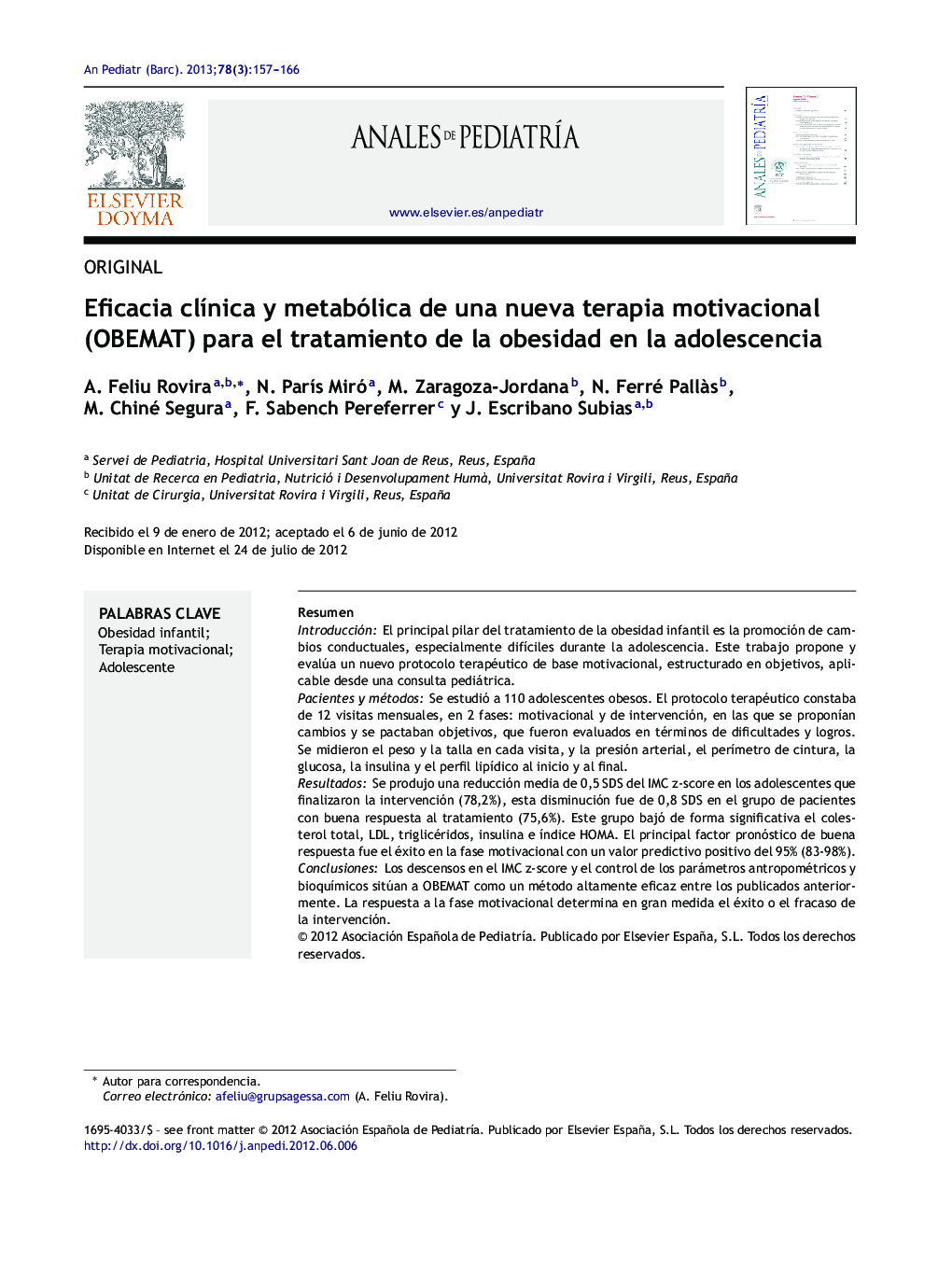| کد مقاله | کد نشریه | سال انتشار | مقاله انگلیسی | نسخه تمام متن |
|---|---|---|---|---|
| 4141809 | 1272344 | 2013 | 10 صفحه PDF | دانلود رایگان |

ResumenIntroducciónEl principal pilar del tratamiento de la obesidad infantil es la promoción de cambios conductuales, especialmente difíciles durante la adolescencia. Este trabajo propone y evalúa un nuevo protocolo terapéutico de base motivacional, estructurado en objetivos, aplicable desde una consulta pediátrica.Pacientes y métodosSe estudió a 110 adolescentes obesos. El protocolo terapéutico constaba de 12 visitas mensuales, en 2 fases: motivacional y de intervención, en las que se proponían cambios y se pactaban objetivos, que fueron evaluados en términos de dificultades y logros. Se midieron el peso y la talla en cada visita, y la presión arterial, el perímetro de cintura, la glucosa, la insulina y el perfil lipídico al inicio y al final.ResultadosSe produjo una reducción media de 0,5 SDS del IMC z-score en los adolescentes que finalizaron la intervención (78,2%), esta disminución fue de 0,8 SDS en el grupo de pacientes con buena respuesta al tratamiento (75,6%). Este grupo bajó de forma significativa el colesterol total, LDL, triglicéridos, insulina e índice HOMA. El principal factor pronóstico de buena respuesta fue el éxito en la fase motivacional con un valor predictivo positivo del 95% (83-98%).ConclusionesLos descensos en el IMC z-score y el control de los parámetros antropométricos y bioquímicos sitúan a OBEMAT como un método altamente eficaz entre los publicados anteriormente. La respuesta a la fase motivacional determina en gran medida el éxito o el fracaso de la intervención.
IntroductionThe mainstay of the treatment of childhood obesity is the promotion of behavioural changes, which are especially difficult during adolescence. This paper proposes and evaluates a new motivation-based therapeutic protocol, structured in objectives, which is applicable from paediatric practice.Patients and methodsA total of 110 obese adolescents were studied. The therapeutic protocol consisted of 12 monthly visits, in two phases: Motivational and Interventional, in which changes were proposed and objectives were agreed, and later evaluated taking into account the difficulties and achievements. Weight and height was measured in each visit, and blood pressure, waist circumference, glucose, insulin and lipid profile were measured at the beginning and at the end.ResultsThere was a mean decrease of 0.5 SDS in BMI z-score in the adolescents who completed the intervention (78.2%), with this decrease being 0.8 SDS in the group of patients with good response to treatment (75.6%). This group had a significantly lower total cholesterol, LDL, triglycerides, insulin and HOMA index. The main predictor of good response was the success of the motivational phase, with a positive predictive value of 95% (83-98%).ConclusionsBMI z-score decreases and the control of anthropometric and biochemical parameters, show that OBEMAT is a highly effective method compared to those published previously. The response to the motivational phase largely determines the success or failure of the intervention.
Journal: Anales de Pediatría - Volume 78, Issue 3, March 2013, Pages 157–166